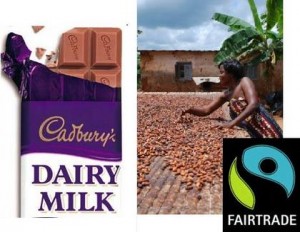 At the launch of Cadbury’s FAIRTRADE Dairy Milk bar in Birmingham last year, I came face to face with an interesting ethical dilemma. Fairtrade or Local? It’s not necessarily a choice you might have thought you’d ever have to make, but you’d be wrong.
At the launch of Cadbury’s FAIRTRADE Dairy Milk bar in Birmingham last year, I came face to face with an interesting ethical dilemma. Fairtrade or Local? It’s not necessarily a choice you might have thought you’d ever have to make, but you’d be wrong.
While Cadbury’s were trumpeting the benefits to Ghanain cocoa farmers of their ‘ethical switch’ little attention was being given to the other vital ingredient in their flagship bar – sugar. To ensure that Dairy Milk could be labelled 100% Fairtrade, Cadbury’s also had to commit to sourcing all the sugar in it according to Fairtrade principles and so a decision had been made to get it from a Fairtrade source in Belize.
The sugar market in the UK is a market of two halves. Half of our sugar is imported exclusively by Tate and Lyle from Less Developed Countries that were once part of the Commonwealth such as Mauritius and Belize. This sugar comes in by ship and is refined at Tate and Lyle’s refinery on the Thames in East London, one of the world’s largest refineries. No doubt. Tate and Lyle were over the moon about winning a contract as big as Cadbury’s Dairy Milk.
But business is a world of competition, of winners and losers, wherever there is a contract won there is usually a contract lost. At first I thought that Belize’s gain must surely be some poor Third World’s country’s loss. Somewhere in Swaziland or Zambia, I imagined a farmer was receiving the bad news that his sugar wasn’t ‘fair enough’ and so Cadbury’s were taking their business elsewhere. I wondered where exactly this poor soul might be but I was surprised to discover that previously Cadbury’s sugar for their Dairy Milk bars had been sourced from “Somewhere in East Anglia.”
Now Jade Goody famously thought that ‘East Angular’ was a foreign country but for the rest of us it’s still a part of Britain. Just down the road in fact from Birmingham where the Cadbury factory is. I’d say you could probably drive your processed sugar beet from Norfolk to Birmingham along the A14 in around three hours.
This is where the other half of our sugar comes from. British Sugar is responsible for the production of the other million tonnes of sugar we consume every year. They refine sugar grown by around 4000 farmers located all over East Anglia and the East Midlands. The total value of these contracts is worth over £200 million to British farmers.
The move from British sugar beet to Belize sugar cane wasn’t in the press pack at Cadbury’s. I felt as though I’d discovered a dirty little secret that I wasn’t supposed to and was suddenly confused. I’m supposed to buy British because I’m supposed to cut down my carbon footprint and the sugar industry in Britain needs support as a world leader in the development of sustainable bio-fuels not to mention the stewardship of the Great British countryside. But then don’t the farmers in Belize need my help too?
I felt thrown on the horns of an ethical dilemma, a dilemma that I’m sure Cadbury’s had already considered; Third World versus Home Grown. Cadbury’s have obviously pitched down on the side of the Developing world and they are banking on their customers doing the same. Not that they are particularly going out of their way to draw their customers attention to it.
TO BE CONTINUED….






